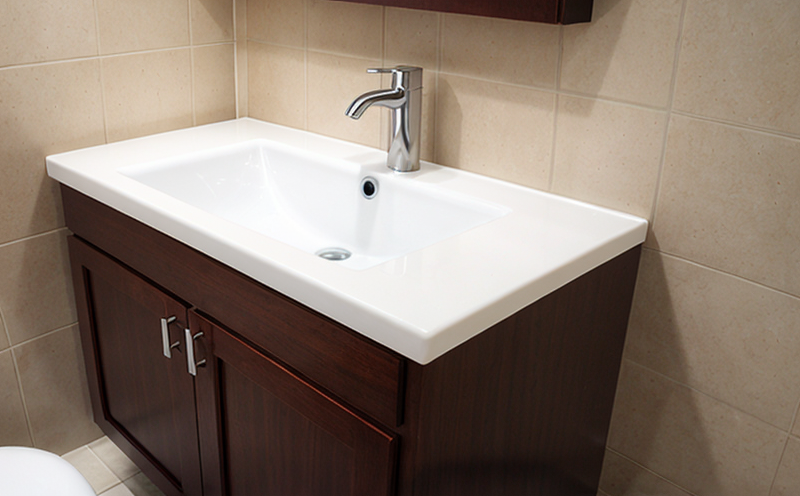BS EN 15372 Mechanical Strength Testing of Plastic Bathroom Furniture
The British Standard and European Norm (BS EN) 15372 specifies the mechanical strength testing methods for plastic bathroom furniture, ensuring that products meet stringent quality and safety requirements. This test is critical in guaranteeing that items such as toilet seats, bidets, bathtubs, and shower trays can withstand the stresses of daily use without compromising structural integrity or user safety.
Plastic bathroom furniture must endure significant mechanical stress due to frequent handling, weight distribution, and environmental factors like temperature changes. This testing protocol evaluates how well materials hold up under specific loading conditions, including static load capacity, fatigue resistance, and impact strength. The standard applies to both new product development and ongoing quality assurance processes.
The BS EN 15372 framework aims at promoting consumer confidence in bathroom furniture products by ensuring they are robust enough for everyday use without posing risks of failure or injury. By adhering to this international standard, manufacturers can demonstrate compliance with industry best practices and regulatory requirements.
Our laboratory employs state-of-the-art equipment and experienced technicians who adhere strictly to the guidelines set forth in BS EN 15372. We utilize precise measurement tools and advanced materials science techniques to ensure accurate results. Our testing services provide valuable insights into product performance, helping manufacturers optimize their designs for better durability while maintaining aesthetic appeal.
For quality managers looking to enhance product reliability, compliance officers seeking assurance of regulatory adherence, or R&D engineers aiming to refine design iterations, our BS EN 15372 mechanical strength testing offers indispensable support. Additionally, procurement teams benefit from this service by validating the consistency of purchased materials across different suppliers.
The testing process typically involves preparing samples according to specified dimensions and conditions outlined in the standard. Specimens are subjected to various types of loading, including compression, tension, shear, and impact tests. Afterward, detailed reports are generated summarizing findings regarding material properties and structural behavior under stress.
By leveraging our expertise in BS EN 15372 mechanical strength testing, clients can gain a competitive edge by producing high-quality bathroom furniture that meets or exceeds international standards. This ensures customer satisfaction while fostering trust within the marketplace.
Scope and Methodology
The scope of BS EN 15372 covers various aspects related to mechanical strength testing for plastic bathroom furniture, including toilet seats, bidets, bathtubs, and shower trays. The methodology involves several key steps:
| Step | Description |
|---|---|
| 1. Specimen Preparation | Ensures specimens are cut to appropriate dimensions as per the standard. |
| 2. Loading Conditions | Determines how specimens will be exposed to different types of mechanical forces. |
| 3. Testing Equipment Calibration | Guarantees accuracy and precision in measurement instruments used during testing. |
| 4. Data Collection & Analysis | Gathers information on specimen responses under various loading scenarios, then interprets these results. |
The BS EN 15372 standard ensures that all tests conducted are consistent with internationally recognized practices, allowing for reliable comparisons between different products and manufacturers. Our laboratory adheres strictly to these procedures to deliver accurate and consistent results.
Benefits
- Enhanced Product Quality: Identifies potential weaknesses in design or manufacturing processes early on, enabling improvements before product release.
- Informed Decision-Making: Provides data-driven insights into material performance, helping stakeholders make informed decisions about future developments.
- Regulatory Compliance: Ensures adherence to relevant international standards like BS EN 15372, reducing legal risks associated with non-compliance.
- Increased Customer Trust: Demonstrates commitment to producing safe and reliable products, thereby boosting brand reputation and customer loyalty.
In summary, our mechanical strength testing service not only supports innovation but also protects against costly errors or recalls by providing comprehensive evaluation of product performance.
Customer Impact and Satisfaction
- Better Products: By identifying issues early in the development cycle, customers can expect improved durability and reliability from their bathroom furniture.
- Competitive Advantage: Meeting or exceeding international standards enhances a company's market position, attracting more discerning buyers.
- Enhanced Reputation: Demonstrating adherence to high-quality testing protocols boosts brand image among consumers and industry peers alike.
- Reduced Costs: Early detection of flaws reduces the likelihood of costly repairs or replacements later down the line, saving money overall.
Through our rigorous mechanical strength testing services, customers gain confidence in their products' ability to stand up against real-world conditions, ultimately leading to higher levels of customer satisfaction.





